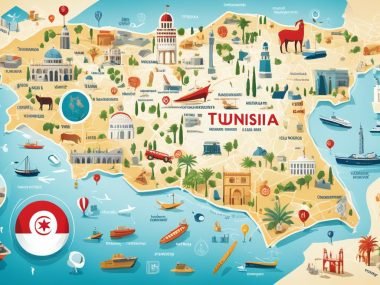In Tunisia, people who do simple jobs usually earn between 840 and 940 TND. That’s about £202 to £226. But in the IT, finance, and telecom industries, workers make a lot more. This shows how varied Tunisia’s job market is. In big cities like Tunis, Sousse, and Sfax, skilled workers get paid much more than the average.
Key Takeaways
- The average salary in Tunisia ranges from 840 to 940 TND for unskilled labourers.
- High-demand sectors such as IT, finance, and telecoms offer higher wages.
- Skilled professionals in urban centres like Tunis, Sousse, and Sfax earn significantly more.
- Education level plays a crucial role in salary determination.
- In-demand skills significantly increase earning potential.
Introduction to Salary Trends in Tunisia
Understanding salary trends in Tunisia is complex. It looks at various factors, like jobs and education. Cities like Tunis and Sfax show higher wages. This is because they have more jobs and living there costs more.
Public sector employment offers extra benefits. These include job security and pensions. These perks may make up for the lower wage compared to private jobs. But, private companies, especially foreign ones, pay more. They do this to get and keep skilled workers. This is true in IT and finance.
Wages vary a lot across sectors in Tunisia. Telecoms and oil extraction, for example, pay better than farming and retail.
| Economic Sector | Average Monthly Salary (TND) |
|---|---|
| Information Technology | 3,000 |
| Telecommunications | 2,800 |
| Agriculture | 1,200 |
| Retail | 1,500 |
| Oil Extraction | 4,500 |
Many factors influence wages in Tunisia. These differences show the country’s economic and social states. It’s important to keep up with these changes. They affect both workers and companies.
Factors Influencing Salaries in Tunisia
Tunisia Salary Information shows what affects earnings in the country. Factors include the type of job, education and skills, work experience, and place.
Economic Sector
The job sector is very important in the Tunisian Pay Scale. Jobs in popular sectors like IT and telecoms pay more. This is because they’re in high demand, make more money, and need special skills compared to jobs in tourism or manufacturing.
Education and Skills
Education and skills matter a lot for Tunisia Salary Information. Having advanced degrees and rare skills means you could earn more. People with higher education get paid more because they know more and can do more advanced work.
Experience
Experience also affects the Tunisian Pay Scale. Workers with a lot of experience earn more. This is because they know their job well and can do it better, making them more productive.
Geographical Location
Where you work in Tunisia changes how much you earn. Big cities like Tunis and Sfax have higher salaries. This is because they have a bigger economy and more jobs than the countryside.
Role of Education in Determining Salary in Tunisia
In Tunisia, learning more can lead to earning more. Higher education often means better-paid jobs. This depends on the subject you study and what jobs are needed.
For example, engineering and IT jobs pay well because they are in high demand. But not all fields pay the same, even with the same level of education.

It’s important to know how education affects what you earn. Choosing what to study carefully can help you get a good job later. Matching your career goals with what you learn is key.
| Education Level | Average Salary (TND) |
|---|---|
| High School | 15,000 |
| Bachelor’s Degree | 25,000 |
| Master’s Degree | 35,000 |
| PhD | 45,000 |
| Sector | Wage Gap Percentage |
|---|---|
| Manufacturing | 32% |
| Technology | 29% |
| Healthcare | 16% |
| Education | 12% |
| Agricultre | 38% |
Highest Paying Occupations in Tunisia
Tunisia has many jobs that pay well. This attracts skilled people. Sectors like tech, finance, and health stand out.
In tech, jobs like software engineers and IT managers pay well. They are key in digital change. Finance jobs also offer good pay. This includes financial analysts and account managers. In health, surgeons and doctors earn a lot. Their skills are much needed.
Here are some top-paying jobs and what they earn:
| Occupation | Typical Salary Range (TND) |
|---|---|
| Software Engineer | 30,000 – 50,000 |
| Financial Analyst | 35,000 – 55,000 |
| Surgeon | 60,000 – 90,000 |
| IT Manager | 40,000 – 70,000 |
| Investment Banker | 50,000 – 80,000 |
| Pharmacist | 35,000 – 60,000 |
These jobs need special training. This is why they pay so much. They offer good money, stability, and chances to grow.
Salary Distribution by Age Group
In Tunisia, how much people earn changes a lot with age. This shows how valuable experience and being in a job longer is. We see interesting trends when we look into Tunisian Salary Demographics and Age-Based Income Statistics.
Under 24
Young workers under 24 start off earning about 1,214 TND on average. This early salary is important for their future.
Age Group 25-34
When people get to 25-34, they make more money. This is because they’ve gained skills and experience. They now earn about 1,666 TND, which is a big increase.
35-44 Years Old
Those aged 35-44 earn even more, thanks to their deep knowledge and solid jobs. They make an average of 1,878 TND. This shows that the more you work, the more you can earn.
These numbers show us how earnings grow with age and work experience in Tunisia. It’s clear that age and experience really matter when it comes to how much you earn.
Conclusion
In Tunisia, figuring out salaries is complex. Many things like education, work experience, and where you live matter. They all shape how much money people can earn in Tunisia.
If you study more, you usually earn more. Having lots of experience helps too. People in cities like Tunis can find better-paying jobs than in countryside areas.
There are still problems, like not everyone getting paid the same for the same work. But, knowing how it all works can help you choose a good career. Despite the challenges, there are ways to do well if you keep learning new skills.
Source Links
- https://www.timecamp.com/average-salary/tunisia/ – Average Salary in Tunisia – Complete Guide 2024 – TimeCamp
- https://www.paylab.com/tn/salaries-in-country – Salaries in Tunisia – Paylab.com
- https://www.salaryexplorer.com/average-salary-wage-comparison-tunisia-c220 – Average Salary in Tunisia 2024 – The Complete Guide








